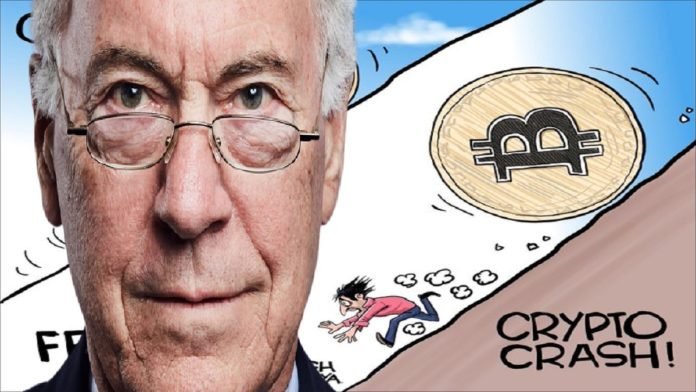<!-- Google AdSense AMP snippet added by Site Kit -->
<amp-auto-ads type="adsense" data-ad-client="ca-pub-7026113949539412"></amp-auto-ads>
<!-- End Google AdSense AMP snippet added by Site Kit -->

<p class="has-text-align-center"><em><strong>Steve Hanke</strong> believes that the value of the first <strong>cryptocurrency </strong>could collapse as quickly as it rose</em></p>



<p><strong>Johns Hopkins</strong> University professor of applied economics and <strong>cryptocurrency </strong>critic <strong>Steve Hanke</strong> is <a href="https://twitter.com/steve_hanke/status/1445499492707409927" target="_blank" rel="noreferrer noopener">confident </a>that the value of <strong>bitcoin </strong>could collapse due to the market law, which says &#8220;what rises must fall.&#8221; </p>



<p>According to <strong>Hanke</strong>, this law will be confirmed by the high volatility and speculative nature of the first <strong>cryptocurrency</strong>.</p>


<blockquote class="twitter-tweet">
<p lang="en" dir="ltr">What goes up must come down, and <a href="https://twitter.com/hashtag/Bitcoin?src=hash&;ref_src=twsrc%5Etfw">#Bitcoin</a> certainly isn’t exempt from this law. <a href="https://twitter.com/hashtag/BTC?src=hash&;ref_src=twsrc%5Etfw">#BTC</a>’s extreme volatility &; speculative nature serve as reminders of the up and down law. <a href="https://t.co/ux9pMy3jwL">pic.twitter.com/ux9pMy3jwL</a></p>
<p>&mdash; Steve Hanke (@steve_hanke) <a href="https://twitter.com/steve_hanke/status/1445499492707409927?ref_src=twsrc%5Etfw">October 5, 2021</a></p></blockquote>
<p> <script async src="https://platform.twitter.com/widgets.js" charset="utf-8"></script></p>



<p>In late September, <a href="https://cointopsecret.com/2021/09/29/economist-compares-bitcoin-to-major-disasters/"><strong>Hanke </strong>compared</a> <strong>Bitcoin </strong>to the world&#8217;s biggest disasters, such as the sinking of the Titanic in 1912 and the Hindenburg airship in 1937. The economist also called the first <strong>cryptocurrency </strong>a speculative asset with zero fundamental value.</p>



<p class="has-text-align-center"><em><strong>Hanke </strong>worked as a senior economist during the administration of US President Ronald Reagan from 1981 to 1982.</em></p>



<p></p>



